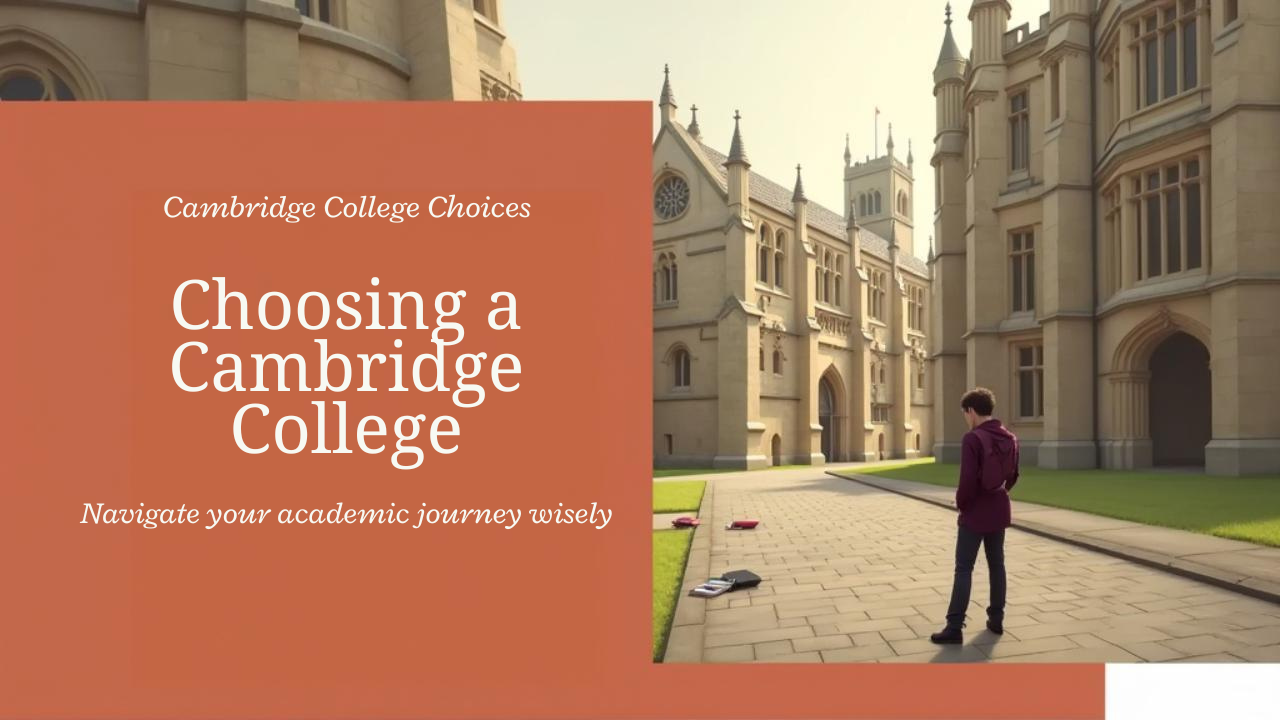This paralysis affects thousands of Cambridge applicants every year. You’ve worked incredibly hard to become competitive for Cambridge, but now you’re facing 31 college choices and every piece of advice seems to contradict the last.
Some sources say college choice doesn’t matter at all. Others insist certain colleges are “easier” to get into. Your teachers recommend their old college, but online forums suggest something completely different. Meanwhile, the application deadline approaches and you’re no closer to deciding.
The truth is that college choice does matter, but not in the way most students think. Understanding what actually affects your chances—and what doesn’t—can transform this overwhelming decision into a strategic choice that enhances rather than complicates your application.
Does Your College Choice Actually Affect Your Admissions Chances?
colleges to choose from at Cambridge
The direct answer is both yes and no, depending on what you mean by “affect your chances.” Your college choice won’t determine whether you receive an offer—Cambridge’s pooling system ensures that strong candidates aren’t rejected simply because they chose a competitive college.
However, your college choice does affect your experience during the application process and, if successful, your three years at Cambridge. More importantly for applicants, choosing a college that aligns with your subject, learning style, and practical needs can actually strengthen your application by helping you articulate why you want to study at Cambridge specifically.
The pooling system means that if your chosen college can’t offer you a place, other colleges can still make you an offer. This safety net removes the biggest fear most applicants have: that choosing the “wrong” college will destroy their chances entirely.
What Actually Matters When Choosing Your College
Whilst college prestige and reputation create most of the anxiety, they matter far less than practical factors that will affect your daily life and academic experience. The most important considerations are teaching quality in your specific subject, accommodation options, and college culture that matches your personality.
Teaching quality varies significantly between colleges for different subjects. Some colleges have particularly strong reputations in Mathematics, others in English, and some in Natural Sciences. This matters because your supervisor will guide your academic development throughout your degree.
Practical considerations often prove more important than anticipated. College location affects your daily routine, accommodation costs vary substantially between colleges, and some colleges guarantee housing for all three years whilst others don’t. These factors impact your actual experience more than college rankings ever will.
College size and atmosphere also matter significantly. Large colleges offer more societies and facilities but can feel impersonal. Smaller colleges provide closer communities but fewer opportunities. Neither approach is better—the right choice depends on your personality and preferences.
Why Students Get Stuck (And How to Break Through)
Students spend weeks debating between “prestigious” colleges without considering practical factors like subject teaching quality, accommodation, or college culture that will actually affect their experience.
Trying to find the “perfect” college by researching every possible factor leads to decision paralysis. Students create elaborate spreadsheets comparing dozens of criteria without identifying what actually matters most to them.
Choosing based on teachers’ recommendations, friends’ preferences, or online forum advice without considering your own specific needs and circumstances.
The 4-Factor Cambridge College Decision Framework
Research which colleges have particularly strong teaching and facilities in your subject. This directly affects the quality of supervision you’ll receive.
Consider location, accommodation costs, housing guarantee length, and college size based on your personal circumstances and preferences.
Evaluate college atmosphere, student societies, and community size to find an environment where you’ll thrive socially and academically.
Consider how your college choice fits into your overall application narrative and whether it helps demonstrate your commitment to Cambridge specifically.
How Our Cambridge Graduate Tutors Guide College Selection
Strategic college selection requires understanding both the practical realities of Cambridge life and how different colleges support academic success in specific subjects. Our Cambridge-educated tutors provide insights that only come from experiencing the system firsthand.
Jasper graduated from Cambridge with a BA in Computer Science after careful college selection that supported his technical interests. He understands how different colleges approach Computer Science teaching and can guide students toward colleges with strong technical facilities and supervision quality. Jasper helps students move beyond prestige considerations to focus on factors that will actually support their academic goals.

Sneha graduated from Cambridge with her degree in English Literature after choosing a college that matched both her academic interests and personal preferences. She provides particular insight into how college choice affects humanities students and helps applicants understand the real differences between college approaches to English supervision and teaching.

Both tutors emphasise that successful college selection involves understanding your own priorities rather than following generic advice. They help students identify what matters most for their specific situation and subject, then match those priorities to colleges that excel in those areas.
Your College Decision Action Plan
Step 1: Identify Your Priorities – List the three most important factors for your Cambridge experience. Consider subject strength, location preferences, accommodation needs, college size, and cultural atmosphere.
Step 2: Research Subject-Specific Strengths – Contact admissions offices or current students to understand which colleges have particularly strong reputations in your subject area.
Step 3: Eliminate Based on Deal-Breakers – Remove colleges that definitely don’t meet your essential criteria, such as location requirements or accommodation preferences.
Step 4: Make Your Final Choice – Select the college that best balances your priorities. Remember that the pooling system provides safety nets, so choosing based on fit rather than perceived admission ease is advisable.
Throughout this process, consider how your college choice will strengthen your personal statement and interview discussions about why you want to study at Cambridge specifically.
Experience the Greenhill Academics Difference
Our Cambridge-educated tutors have navigated these exact college selection challenges and understand how different colleges support academic success in specific subjects. They combine firsthand experience with strategic insight to help you make informed decisions that strengthen rather than complicate your application.
We don’t just help you choose a college—we help you understand how that choice fits into your overall Cambridge application strategy. Our tutors know how to transform college selection anxiety into confident decision-making based on factors that actually matter for your academic success.
Transform Your College Choice from Anxiety into Strategic Advantage
Discover how our Cambridge graduates can help you make informed college decisions that strengthen your entire application.
Cambridge College Choice FAQs
No, Cambridge’s pooling system ensures strong candidates can still receive offers from other colleges even if their first choice can’t accommodate them. Choose based on fit rather than perceived admission ease.
Subject-specific teaching quality matters more than general college reputation. Research which colleges have particularly strong supervision and facilities in your area rather than focusing on overall prestige.
If possible, visiting helps you understand college atmosphere and practical factors like location and facilities. However, virtual tours and current student contacts can provide similar insights if visits aren’t feasible.
Accommodation costs can vary significantly, and some colleges guarantee housing for all three years whilst others don’t. Consider your budget and housing preferences when making your choice.
College transfers are extremely rare and only permitted in exceptional circumstances. It’s important to choose thoughtfully from the start rather than assuming you can change later.
Read college student newspapers, follow college social media accounts, and contact current students directly. College websites often present similar images, but student voices reveal the real cultural differences.
Book a free consultation where we’ll discuss your priorities, subject requirements, and personal preferences to create a strategic college selection plan.
